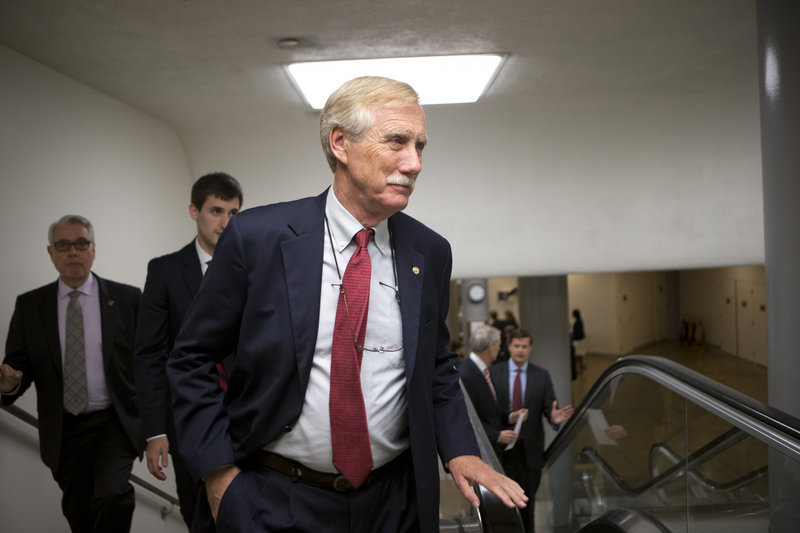WASHINGTON — The White House on Tuesday backed a bipartisan plan to fundamentally change how federal student loans are calculated, even as Maine Sen. Angus King and other co-authors of the deal worked to win over skeptical Democrats.
Both chambers of Congress must act by the end of next week — prior to lawmakers’ August recess — if they want to rescind the higher interest rates that began July 1 for millions of undergraduates. The bipartisan plan would remove Congress from the process of setting interest rates and would, instead, link rates to the 10-year Treasury note plus an additional percentage, depending on the type of loan.
The initial result would be lower interest rates for all borrowers this fall, including graduate students and parents. But some Democratic lawmakers worry the bill opens the door to much higher rates down the road and are still pushing to alter or scuttle the bill.
“We will see how it goes,” King, an independent, said Tuesday afternoon as he prepared to join other members of the Democratic caucus for a lunch meeting. “I think it will be unfortunate if (it fails) because we would end up with the status quo, which means kids will be paying a lot more money in interest rates.”
In an apparent effort to win over additional critics, Obama administration officials praised the deal as offering “meaningful relief” to borrowers and released state-by-state estimates of potential savings.
In Maine, an undergraduate borrowing for the upcoming college year would save $1,376 over the life of those loans by borrowing at a rate of 3.96 percent compared to the 6.8 percent rate currently in law. Roughly 39,000 Maine students or borrowers would pay lower rates under the bill, according to figures from the White House. Nationally, the typical undergraduate student would save $1,545 over the lifetime of a loan taken out this year.
“This bipartisan compromise, we absolutely believe, is a win for students,” Education Secretary Arne Duncan told reporters.
The current bill would set the same interest rate for all undergraduate Stafford loans. Rates would be locked in for the life of that particular loan, but rates for new loans would vary year-to-year depending on the market.
Loans would be capped at 8.25 percent for undergraduates, 9.5 percent for graduate student loans and 10.5 percent for PLUS loans taken out by parents.
While both Democrats and Republicans said Tuesday they are confident the bill has enough votes to pass the Senate, it was an open question whether it would receive the support from the majority of Democrats.
Senate Majority Leader Harry Reid said he hoped to hold votes later this week on the bipartisan bill. But Reid indicated he planned to allow votes on three amendments aiming to lower the cap on rates and to sunset the new program in two years.
The sponsor of the latter sunset proposal, independent Sen. Bernie Sanders of Vermont, said the current bill “would be a disaster” for college-bound students and their parents who also take out loans.
Like other critics, Sanders said the current bill does nothing to address the larger issue of rising student debt loads due to skyrocketing higher education costs. In 2011, the average student loan debt among graduates from Maine’s colleges and universities was $26,046, according to a report from the Project on Student Debt.
“This issue is too important to be rushed through this body without hearings, without listening to the people who will be affected by this bill,” Sanders said on the Senate floor. Instead, Congress should spend the next two years looking at comprehensive college affordability reforms, he said.
Other critics, such as U.S. Sen. Elizabeth Warren, D-Mass., contend the bipartisan bill continues the current practice of overcharging students in order to help generate revenue for the federal government.
Sen. Joe Manchin, a West Virginia Democrat and key architect of the bill, agreed that college affordability is a major issue that senators will examine as they consider a new omnibus higher education act.
Manchin described the tone of Tuesday’s Democratic caucus meeting as “respectful” despite the differences of opinion among members.
King, meanwhile, indicated that he didn’t expect everyone in the Democratic caucus to be comfortable with the bill.
“I don’t think issues need to be decided on a straight party-line vote. I think people should do what they think is right,” King said. “We have got to get away from ‘This is the party line’ and try to get to ‘This is what we all think is best for the country.”‘
Kevin Miller can be contacted at 317-6256 or at kmiller@pressherald.com
Twitter: @KevinMillerDC
Copy the Story LinkSend questions/comments to the editors.




Success. Please wait for the page to reload. If the page does not reload within 5 seconds, please refresh the page.
Enter your email and password to access comments.
Hi, to comment on stories you must . This profile is in addition to your subscription and website login.
Already have a commenting profile? .
Invalid username/password.
Please check your email to confirm and complete your registration.
Only subscribers are eligible to post comments. Please subscribe or login first for digital access. Here’s why.
Use the form below to reset your password. When you've submitted your account email, we will send an email with a reset code.